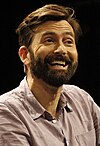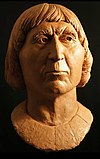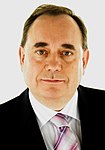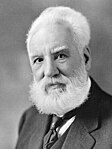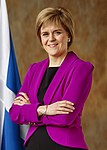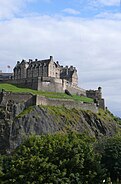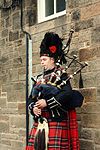
|
Bagpipes are largely associated with Scottish music and Scottish culture
|

|
Shirley Manson initially achieved moderate success as a member of the band Goodbye Mr Mackenzie in the 1980s, before her subsequent project Angelfish was discovered by the American members of Garbage. Manson gained media attention for her forthright style, rebellious attitude, and distinctive deep voice.[3][4][5][6][7] In 1995, Garbage released their self-titled debut album, a critical and commercial success. The band have released seven studio albums, including the multiple Grammy Award-nominated Version 2.0 and a greatest hits album.[7] Garbage have toured worldwide and sold over 17 million records as of 2017.[8] In 2008, she played a liquid metal T-1001 Terminator named Catherine Weaver in the second season of Terminator: The Sarah Connor Chronicles.
|

|
The Proclaimers became known for singing in distinct Scottish accents with a few Scots words. They came to attention with their 1987 single "Letter from America", which reached No. 3 in the United Kingdom, and the 1988 single "I'm Gonna Be (500 Miles)", which topped charts in Australia,[9][10] Iceland and New Zealand.[11] The duo's biggest album, Sunshine on Leith (1988) has been certified multi-Platinum in Australia and Canada, selling over 2 million copies worldwide, including around 700,000 in the United States.[12] The Proclaimers have sold over 5 million albums worldwide.[13][14]
|

|
The Bay City Rollers were one of the world's biggest bands, and they were widely known for their worldwide teen idol popularity in the 1970s. They have been called the "tartan teen sensations from Edinburgh" and are one of many acts heralded as the "biggest group since the Beatles".[15] According to the BBC, the Bay City Rollers sold 120 million records.[16]
|

|
Runrig, one of the most commercially successful groups to sing in Scottish Gaelic. Runrig's music is often described as a blend of folk and rock music, with the band's lyrics often focusing upon locations, history, politics, and people that are unique to Scotland. Songs also make references to agriculture, land conservation and religion.[17] In August 2018, Runrig performed the final shows of their farewell tour, entitled The Last Dance, in Stirling City Park beneath the castle ramparts.[18] An estimated 52,000 fans attended The Last Dance.[19] Bruce Guthro died on 5 September 2023 from cancer.[20]
|

|
Annie Lennox, one of the most commercially successful artists of the 1980s with Eurythmics, and the 1990s as a solo artist, was known for her androgyny during the 1980s. She has been dubbed the "Brits Champion of Champions", with eight Brit Awards, which includes being named Best British Female Artist a record six times. Lennon has sold 80 million records internationally.[21]
|

|
Susan Boyle, who's debut album I Dreamed a Dream is one of the best-selling albums of the 21st century, having sold over 10 million copies worldwide, and it was the best-selling album internationally in 2009.[22] Boyle became the first female artist in history to have a number one album simultaneously in both the United Kingdom and United States within the space of a year. In 2011, Boyle made UK music history by becoming the first female artist to achieve three successive albums debut at No.1 in less than two years.[23]
|

|
Calvin Harris rose to international prominence with the release of his third studio album, 18 Months. Harris had achieved success with his first two albums across Europe. 18 Months topped the UK Albums Chart, earning him his second UK Number One album following Ready for the Weekend in 2009, and became his first album to chart on the US Billboard 200, peaking at number 19. All eight of the album's singles reached the top 10 in the UK, breaking the record for the most top 10 songs from one studio album on the UK Singles Chart with eight entries, surpassing Michael Jackson's record. Harris became the first artist to place three songs simultaneously on the top 10 of Billboard's Dance/Electronic Songs chart.[24] He also became the first UK solo artist to reach more than one billion streams on Spotify.[25] Harris has received 18 Brit Award nominations–winning British Producer of the Year and British Single of the Year in 2019,[26] as well as five Grammy nominations, including a win for Best Music Video in 2013.[27]
|

|
Lewis Capaldi achieved international success with his single "Someone You Loved", released in 2018, which topped the UK Singles Chart where it remained for seven weeks, and in November 2019, it reached number one on the US Billboard Hot 100; it was nominated at the 62nd Annual Grammy Awards for Song of the Year and won the 2020 Brit Award for Song of the Year. "Someone You Loved" was the bestselling single of 2019 in the UK. In May 2020, it was announced that Capaldi's song "Someone You Loved" had become the longest-running top 10 UK single of all time by a British artist.[28]
|

|
Midge Ure achieved success in the 1970s and 1980s in bands including Slik, Thin Lizzy, Rich Kids and Visage, and as the second frontman of Ultravox. He co-wrote and produced the charity single "Do They Know It's Christmas?", which has sold 3.7 million copies in the UK. The song is the second-highest-selling single in UK chart history.[29] Ure co-organised Band Aid, Live Aid and Live 8 with Bob Geldof.
|

|
Paolo Nutini achieved international success in 2006 following the release of his debut album These Streets. He has received three BRIT Award nominations and an Ivor Novello Award nomination for songwriting. In July 2014, he was referred to by the BBC as "arguably Scotland's biggest musician right now."[30]
|
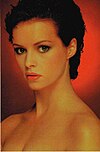
|
Sheena Easton achieved international recognition in the early 1980s following the release of her first two singles "Modern Girl" and "9 to 5" both entered the top ten of the UK Singles Chart simultaneously. She became one of the most successful British female recording artists of the 1980s. Easton became the first and only recording artist in Billboard history to have a top five hit on each of Billboard's primary singles charts: "Morning Train (Nine to Five)" (Pop and Adult Contemporary), "We've Got Tonight" with Kenny Rogers (Country and Adult Contemporary) and "Sugar Walls" (R&B and Dance). She is a six-time Grammy Award nominee, Easton is a two-time Grammy Award winner – Best New Artist in 1982[31] and Best Mexican-American Performance in 1985[32] for her duet with Mexican singer Luis Miguel on the 1984 single "Me Gustas Tal Como Eres".
|

|
Lulu is highly regarded due to her "powerful singing voice",[33] Lulu began her career in the UK but soon became known internationally. She had major chart hits with "To Sir with Love" from the 1967 film of the same name, which topped the Billboard Hot 100, and with the title song to the 1974 James Bond film The Man with the Golden Gun. In European countries, she is also widely known for the Eurovision Song Contest 1969 winning entry "Boom Bang-a-Bang", and for her 1964 hit "Shout", which she performed at the closing ceremony of the 2014 Commonwealth Games in Glasgow.
|





















